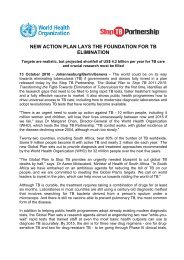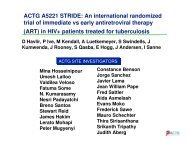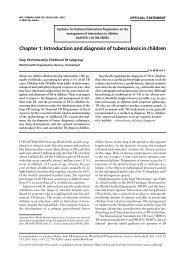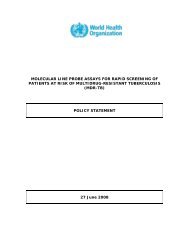Thailand - Stop TB Partnership
Thailand - Stop TB Partnership
Thailand - Stop TB Partnership
Create successful ePaper yourself
Turn your PDF publications into a flip-book with our unique Google optimized e-Paper software.
egional level, and does not give an accurate picture of overall funding for <strong>TB</strong> control activities.<br />
Furthermore, a significant portion of the NTP’s budget is now being covered with<br />
resources provided by the Global Fund; 132 45 percent of the NTP’s 2005 budget came from<br />
this source. This increasing reliance on outside funding raises some concerns about longterm<br />
sustainability of important NTP programs.<br />
At present, comprehensive NTP budgetary data is not available for the period from<br />
2003 to 2005, and there is no system in place to ensure budgetary transparency moving<br />
forward. In order to obtain a more comprehensive estimate of <strong>TB</strong> spending, the NTP should<br />
implement a financial monitoring system to track budgets and available funding for all<br />
provinces and districts.<br />
Monitoring and evaluation<br />
The NTP publishes official quarterly and annual reports detailing its <strong>TB</strong> control activities,<br />
as required by the DOTS strategy. These reports are reviewed by the provincial chief medical<br />
officers, the <strong>TB</strong> Cluster, and the DDC, and are available publicly on the Internet and in<br />
brochures and reports.<br />
Infrastructure, drugs, and research<br />
Primary health care system<br />
The NTP provides <strong>TB</strong> control services through the primary health care system. <strong>TB</strong> treatment<br />
is provided through local health centers to maximize the accessibility of services to patients.<br />
Decentralization of the health care system has created opportunities to enhance pro-poor,<br />
equity-oriented approaches to communicable disease prevention and treatment.<br />
Most notably, village health volunteers are intended to act as a two-way link between<br />
communities and the health care system. In addition to providing health education and services<br />
(such as DOT), they are well positioned to provide feedback to health authorities on<br />
community health issues and priorities. Village health volunteers constitute a central pillar<br />
of the decentralization process, and the success of the pro-poor strategy is largely dependent<br />
on their skills, capacity, commitment, and confidence to reach out and to work positively<br />
with poor and excluded groups. As noted above, village health volunteers need additional<br />
support, training, and motivation to fill this extremely critical role.<br />
58<br />
<strong>TB</strong> POLICY IN THAILAND







![Global Drug Facility Annual Report 2011 [.pdf] - Stop TB Partnership](https://img.yumpu.com/26788745/1/184x260/global-drug-facility-annual-report-2011-pdf-stop-tb-partnership.jpg?quality=85)

![Concept note on national stop TB partnership [.pdf]](https://img.yumpu.com/26788741/1/184x260/concept-note-on-national-stop-tb-partnership-pdf.jpg?quality=85)



![2005 and Challenges for 2006 - 2015 [.pdf] - Stop TB Partnership](https://img.yumpu.com/26788674/1/190x245/2005-and-challenges-for-2006-2015-pdf-stop-tb-partnership.jpg?quality=85)
![Brochure (French) [.pdf] - Stop TB Partnership](https://img.yumpu.com/17234792/1/190x91/brochure-french-pdf-stop-tb-partnership.jpg?quality=85)

